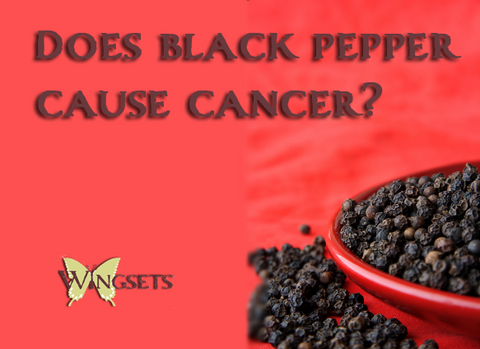Updated February 28, 2014
What's interesting, to me at least, is that I had spent the better part of the day documenting how and why some of the chemical constituents in Black Pepper (Piper nigrum) essential oil actually inhibited the proliferation of cancer cells. I usually check the internet last - and for a reason. It usually is full of contradictory information, lots of fluff and I particularly hate those "information-based" sites that have far more advertisements than anything resembling researched, evidence-based information. Most of them are just repeating what they've seen on other websites and/or some of the million aromatherapy books on the market place today. Don't get me wrong, there are lots of very good books on the subject of essential oils and aromatherapy. I use mine often and greatly appreciate the time and effort that must have gone into the research and information the authors have shared with us. We do have a list of "resources" where we list the books I have used over the years that are definitely well worth purchasing. I need to update that, but I don't recommend a book unless I have actually read it and feel that it's worth recommending.

I noticed, however, as I did a search for black pepper, I came up with quite a few sites telling me that black pepper (the spice) was in fact "pathogenic and carcinogenic." One website in particular also included in that category cayenne pepper, vinegar and garlic and "hundreds of other condiments that are likewise pathogenic and carcinogenic." Okay - I'm thinking whatever. I checked, however, and they are not the only websites out there stating the same thing! This one article was dated 1980, but this website had a current blog and frankly some other inaccuracies about some subjects that I am familiar with. Of course they are talking about the pepper berry itself that we all use as ground pepper along with our salt shakers, not the essential oil. They also said this information was "according to the University of Kentucky." So I did a search trying to find the abstract for this information. Of course all I got was more links back to this particular website.
Black Pepper actually fights cancer!
I was originally researching the essential oil of black pepper and I'll talk more about that in a minute. But while doing so, I came across many articles (with references this time) stating that black pepper as a spice has a principal phytonutrient called piperine. According to scientists at the University of Michigan Comprehensive Cancer Center, they found that when piperine is combined with curcumin, an anticancer extract of the turmeric herb, it stopped the growth of cancer-forming cells. "High concentrations of the two extracts completely inhibited breast-cancer-forming stem cells." The information published online in the journal Breast Cancer Research and Treatment (1), is the first to suggest these dietary compounds could prevent cancer by targeting stem cells. I wasn't able to determine at this point what "high concentrations" consisted of, but there were many references to this phytonutrient's ability to inhibit cancer cells. I'm assuming that is also why there are a lot of supplements now available for both curcumin and piperine.
Now I have to admit, I could not find piperine mentioned anywhere as a chemical constituent of the essential oil of black pepper. I'm not a molecular biologist but I'm sure someone can enlighten me as to the correlation. I do know that we aromatherapists often assume that the plant (spice in this instance) and the essential oil have the same properties - and they usually do, but not always.
Black Pepper essential oil fights cancer!
What I did find, however, is that the essential oil of black pepper does contain chemical constituents that have been researched and shown to inhibit the proliferation of cancer cells. Let me start by mentioning that some of the main chemical constituents of black pepper are b-caryophyllene, limonene, sabinene, a-pinene and b-pinene. One study found that the common active principles that showed results as having anti-cancer properties were α-pinene, γ-terpinene, 4-terpineol, α-terpineol, τ-cadinene, τ-cadinol and caryophyllene. "Both caryophyllene and α-terpineol showed important antiproliferative effects."(2) Limonene has also been researched and has been shown to inhibit cancer cells. Limonene is found in high percentages in many essential oils, but more about that in another blog when we talk about some of the citrus essential oils.
However, in another study they found that among the tested constituents the highest activity of inhibition was found when a-humulene was applied to cells.(3) A-humulene is also another name for a-caryophyllene.It is an isomer of b-caryophyllene and they are both often found together as a mixture in nature.
In a third study, three constituents were found to be active against the two cell lines tested. They were linalool, b-caryophyllene and alpha-cedrol. The authors of this study also stated: "Interestingly, beta-caryophyllene and linalool exhibited comparable IC(50) values to the commercial drug vinblastine on the ACHN cell line."(4)
So, as excited as I was with this encouraging information, I still was wondering where the misinformation about the black pepper spice originated. I found what might be the answer in Robert Tisserand's classic book on essential oil safety where he mentions that the chemical constituent safrole was banned in the United States in the 1960's after it was discovered that injecting large amounts of this isolated constituent caused liver cancer in lab rats.(5) Apparently, black pepper has "trace" amounts of safrole. After this study, sassafras use was eliminated since it contains approximately 80% safrole.
Bottom line? Black pepper as a spice and black pepper as an essential oil have been shown in repeated studies to inhibit the proliferation of cancer cells! Black pepper is listed as a safe, nontoxic essential oil. To find out more about some of the safety cautions and usage for black pepper essential oil, see our Essential Oil Database, and/or our product description. Even before discovering this important information, black pepper essential oil would be included in one of my top five oils for a home medicine kit.
Thanks for listening!

1. Breast Cancer Research and Treatment, DOI: 10.1007/s10549-009-0612-x
2. Lampronti I, Saab AM, Gambari R (2006) Antiproliferative activity of essential oils derived from plants belonging to the Magnoliophyta division. International Journal of Oncology 29:989-995. http://www.spandidos-publications.com/ijo/29/4/989. Accessed August 14, 2011.
3. Loizzo MR, Tundis R, Menichini F et al (2007) Cytotoxic activity of essential oils from labiatae and lauraceae families against in vitro human tumor models. Anticancer Research 27:3293-3299. http://www.ncbi.nlm.nih.gov/pubmed/17970073. Accessed August 14, 2011.
4. Loizzo MR, Tundis R, Menichini F et al (2008) Antiproliferative effects of essential oils and their major constituents in human renal adenocarcinoma and amelanotic melanoma cells. Cell Proliferation 41:1002-1012. http://www.ncbi.nlm.nih.gov/pubmed/19040575. Accessed August 14, 2011.
5.Tisserand R, Balacs T. Essential Oil Safety, A Guide for Health Care Professionals. London, England; 1995
Meet Ann: Ann's mission statement is to provide health and wellness information to you and your family that you may not find in your every-day newspapers or Prevention magazines. Her college studies, certifications and passionate self-study have provided her with a huge spectrum of understanding of the intricate issues and debates concerning health and nutrition. Ann is a Critical Care Registered Nurse, a Certified Clinical Aromatherapy Professional, and has been studying nutrition, aromatherapy, skin care health and medicinal herbalism for at least 13 years. Not so surprisingly, all of these interact for health and wellness at a level we all want to achieve. She is an ardent pursuer of verified research and information and spends huge amounts of time searching for information that is relevant and evidence based. We sincerely hope you benefit from her efforts.
















